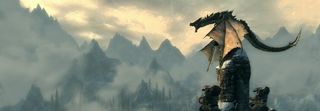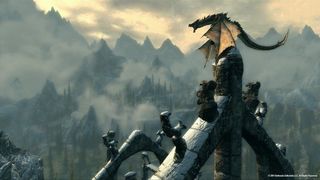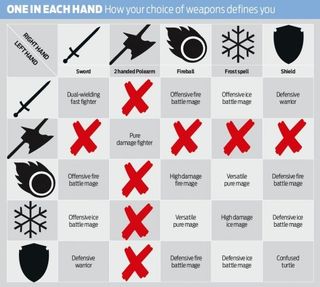The Elder Scrolls V: Skyrim preview

You're nobody – a prisoner rotting in a cell for some unnamed crime. That's true at the start of every main Elder Scrolls game. But this time it's a cell in Skyrim, the freezing Nordic nation between Oblivion's sunny Cyrodiil and the weird Dark Elf land of Morrowind.
You're released. Why, we don't know yet. But you're released into a nation that's tearing itself apart. It's a land governed by nine holds, regions that are traditionally each controlled by a single ruling family. But the system hasn't lasted – many holds are now governed by elected councils, some have been overthrown, and they're on the brink of war with each other. And as the conflict reaches crisis point, the dragons show up.
That's the setting for the fifth game in Bethesda's open-ended RPG series The Elder Scrolls. It uses a new engine, a new combat system, a whole new kind of magic, and an awful lot of snow.

Phenomenal lineage
The Nords aren't the only ones in trouble. The Empire has lost many of its territories in the Dark Elf lands, and a crucial family of rulers have finally died out.
200 years ago, in Oblivion, a prisoner much like yourself saved the world by finding the dead emperor's illegitimate son Martin.
Oblivion was the commercial hit the series always deserved, but it's also a game you can rarely mention without hearing someone's top three gripes about it. A lot of Skyrim's features are direct responses to those complaints, but a few almost seem intentionally defiant.
Martin and his heirs are long gone, and without the Septims – the ruling family around whom all the other Elder Scrolls games revolve – the world is vulnerable to terrible forces.
PC Gamer Newsletter
Sign up to get the best content of the week, and great gaming deals, as picked by the editors.
The Septims are Dragonborns, mortals whose bloodline gives them the power to use dragon magic. The Dragonfires you were trying to light in Oblivion used that magic to protect the mortal realm from the demons of Oblivion. That's why Martin was so important: as the last blood relative of a Septim, only he could keep them burning and the world safe.
When the Dragonborns die out 200 years later, it's not the demons of Oblivion that break through – it's actual dragons. They're already ravaging the world, and they're nothing compared to what's next. Alduin, the biggest and baddest of the long-lost species, is coming. The Elder Scrolls foretold it, and only a Dragonborn can stop it.

Shout out
Which brings us back to our nobody – you. It turns out you are a Dragonborn, perhaps the only one left. In story terms, obviously, that means any world-saving is going to have to be done by you - once you're done arsing around with sidequests and guilds. In game terms, it means you have access to a whole new kind of magic the Elder Scrolls games haven't given us before.
Dragon Shouts are three-word phrases, uttered in the dragon tongue, which function as powerful spells. For them to work, you first need to defeat a dragon and take its soul: that gives you the potential to learn its shout. But the words themselves don't come easily: they're written in the dragon's own language on the walls of crumbling ruins all over Skyrim. The dragon's soul gives you the ability to spot power words among the scratchy ancient glyphs.
There are more than twenty shouts to learn, from one that's effectively 'Force Push', to one you whisper to teleport yourself silently toward an enemy.

Enchantment?
Dragon Shouts are separate from 'conventional' magic, the type any chump with a pointy hat can do. That stuff has been tweaked a bit. The Elder Scrolls games have always split their spells into themed sets called Schools - Destruction, for example, lets you cast all the attacking spells but counts as a single skill as you improve it with practise.
That system is still in, but the schools themselves have changed a little. The school of Mysticism, which has always seemed a little too miscellaneous to count as a themed set, is gone. Its best spells are now part of other schools like Alteration, making that one in particular more worthwhile – its spell set was a little skimpy in Oblivion.
That leaves Destruction (damage-dealing), Restoration (healing and buffs), Conjuration (summoning minions and equipment), Illusion (stealth and confusion), Alteration (utility spells), and Enchantment.
Enchantment is a magical skill last seen in Morrowind, which lets you imbue your favourite weapon or armour with any spell effect you know. In that game, though, it was rarely worth trying it yourself when vendors could do it for you with no risk of failure. Which is probably why Oblivion removed it as a player skill: there's just a pedestal in the Imperial University that does it for you perfectly every time. Since it's always been one of the most powerful and useful abilities in the world, having it as a player skill in Skyrim could be really interesting.
Destruction spells are now more flexible tools: a fire spell is not just a fireball, it can also be used as a flamethrower or to place fire traps on the ground. And Bethesda say they're hoping to let you combine them with one another when you wield different spells in each hand, though exactly how won't be nailed down until they're sure they can do it.
Picking a fight
The most important change to magic is that spells are no longer separated from weapons. Oblivion's system meant that everyone, from a pure mage to a brainless fighter, had to wield both a weapon and a spell at all times. Skyrim is much more freeform: you have two hands, and it's up to you whether to ready two spells, one spell in both hands, a spell in one and a weapon in the other, or even dual-wield any two single-handed weapons.

Note: CONFUSED TURTLE IS A JOKE
If Bethesda can make that look and feel convincing in combat, it'll be among the most flexible and interesting equipment systems we've yet seen in a roleplaying game.
The Elder Scrolls' relationship with combat has always been an interesting one – it's never really been an action game, yet the fact that its combat is physical and reaction-based is one of the main things that sets it apart from the more dice-roll and turn-based RPGs.
With Skyrim they're shifting the focus a little: Oblivion's combat model was all about the sluggishness and difficulty of combat with large, heavy weapons. Skyrim's is more energetic and fast – there are gruesome finishing moves for each weapon and enemy type. It's also more tactical: you can no longer run backwards to get away from a fight while still defending yourself. Your reverse movement is much slower, so you have to decide: stay and fight, or turn and flee?
Next page: Archery, leveling up, and generating story .

The Elder Scrolls Online dev says the 'metaverse' is sinking because it ignored 20 years of games doing the exact same thing: 'It's not new, and they should stop treating it like it's new'

The Elder Scrolls Online has made nearly $2 billion in its lifetime, 9 years after the big comeback that doubled its player count overnight
Most Popular

